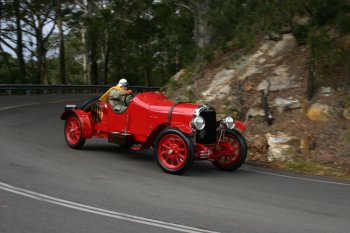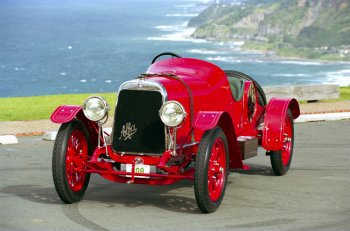|
The Pebble Beach
Concours d'Elegance is the ultimate classic car show,
attracting the most valuable, unique cars and their owners
from around the world to the glorious - and wealthy -
California town of Pebble Beach, near Monterey, and this
year the featured marque is Alfa Romeo, with 62 of the
rarest and most special Alfa Romeos in the world traveling
to the USA for the event on 21 August.
But one of the most special and, as it is the only one in
the world, rarest Alfas has not travelled from Italy, it has
arrived from Australia, the home of the only surviving car
to first carry the name 'Alfa Romeo', the Alfa Romeo G1.
"It is a unique and very special honour to be invited to
take part in the Pebble Beach Concours d'Elegance," says
Neville Crichton, owner of the G1 and Alfa Romeo importer
for Australia and New Zealand. "The organisers have put
together what they, quite justifiably, say is the most
significant display of Alfa Romeos seen anywhere in the
world. The G1 is the start of a history of cars that have
defined style, performance and engineering achievement. It
will be a remarkable display."
The fact that Neville Crichton's Alfa Romeo G1 has survived,
let alone in perfect - and drivable - condition is no less
remarkable in itself. Chassis 6018 was imported new into
Australia in 1921 and was sold, for £850, to a Queensland
businessman who, soon afterwards, was declared bankrupt.
Since he had seen his crash coming, he hid the car to keep
it out of the hands of his creditors. Then, three years on,
he had the misfortune to die and the G1 remained hidden for
25 years, apparently holding up one corner of a shed in the
Queensland outback.
Then it was discovered by a couple of young jackaroos who
decided it would make a fine 'paddock bomb' for rounding up
cattle, chasing kangaroos and all the stuff that blokes do
on farms. Eventually they managed to hit a tree and the
damaged car was towed back to the farm where it was used to
power a water pump. With its massive torque at low engine
speed, it was ideal for the job and the work ensured that
the engine remained in excellent condition even if the rest
of the car was brutalised.
In 1964 it was retired from pump duty and rescued by Alfa
Romeo enthusiasts. The following year the car was bought by
Ross Flewell-Smith who, against the advice of some experts
who thought the car unrestorable, began to rebuild it, an
exercise that took ten years. In this Herculean task he was
helped by the fact that he discovered a second G1, a wreck,
which supplied many of the parts that were missing. Most of
the body was missing and, after experimenting with various
styles, Flewell-Smith took advice from Luigi Fusi who was
then curator of Alfa Romeo's museum. Flewell-Sinith's
rebuild was good enough to win the 1977 Queensland Vintage
Car Concours and to win the 1978 Australian Mile Miglia
memorial run. In an historic race at Lakeside it was clocked
at 86 mph, remarkable performance for a 1921 car, so
remarkable, in fact, it was black-flagged for being so
quick!
In 1995, Flewell-Smith sold this car he had nicknamed 'Milly'
from the 'Milan' on the engine black, to Julian Sterling who
commissioned a restoration to his own exacting
standards. All worn parts were replaced with specially-made
components built regardless of cost. New tyres were supplied
by Michelin, made from the original 1920s moulds, costing
AS$6,000 for the set. The restoration was undertaken up to a
standard, not down to a price, and the work was described in
the 1998 edition of the Classic Car Yearbook as
'breathtaking'. Following a rationalisation of Julian
Sterling's car collection, the car was bought by Neville
Crichton, who has since had the car fully restored in New
Zealand to return it to full drivable condition. Indeed, its
drivability has been demonstrated by Sydney motoring writer,
David Berthon, who, on its very first outing after its
restoration, discovered that it was more than capable of
breaking the 110 km/h freeway speed limit!
The collection of Alfa Romeos that the Australian G1 will
join in Pebble Beach has exceeded even the best hopes of the
organizers, but an Italian marque may not seem to be the
obvious choice for a major event held in the USA. "The
95-year history of the Alfa Romeo race cars and street cars
is remarkable, and the vehicles are of utmost importance in
the collector car world," says Pebble Beach Concours
Co-Chairman Glenn Mounger.
|
 |
|
|
|
 |
|
|
|
"We've chosen to celebrate everything from the full array of
pre-World War II classes to significant postwar custom
coachwork, and there are already several very significant
Alfa Romeos that have been restored and prepared for Pebble
Beach 2005."
The Alfa Romeo G1 will line up with a remarkable collection
of Alfa Romeo cars, including the famous Alfa Romeo 'Bat'
cars, the ultra-imaginative winged BATs (Berlinetta
Aerodinamica Tecnica) of the '50s, and an array of vehicles
that routinely bring world record prices at auction around
the world.
Overall, 27 of the 62 Alfa Romeos participating at the
Concours are being shipped from foreign countries, including
the BAT 5, BAT 7 and BAT 9, which now reside in London. "The
first BAT (5) was built in 1953, when most other carmakers
had never even imagined tailfins and long before there was a
Batmobile on television," says Glenn Mounger. "The BAT 7,
built in 1954, was even more radical in design with huge
curved tailfins. And the final BAT - the BAT 9 - was built
in 1955 with reduced wings and a design that was closer to a
production sports car. We're looking forward to an historic
reunion of these incredible cars. The last time they
appeared together anywhere in the U.S. was the 1989 Pebble
Beach Concours."
Alfa was founded in 1910 as A.L.F.A. (Anonima Lombarda
Fabbrica di Automobili), produced three models during the
next five years and was then purchased by Nicola Romeo in
1915. Automobile production ceased during World War I, so
the first Alfa Romeo, the Alfa Romeo G1, didn't debut until
in 1920. Some successful Formula 1 race cars and production
cars were produced during the decade, followed by the 1931
release of the 8C 2300, a 2.3-liter supercharged
eight-cylinder engine from famed engineer Vittorio Jano. Versions
of this car, which featured two four-cylinder engines, won
the 24 Hours of Le Mans from 1931 - 1935. The displacement
increased to 2.9 liters by 1935 and the 8C 2900A produced a
first, second and third showing at the 1936 Mille Miglia.
In a nice bit of Pebble Beach Concours symmetry, there is a
strong link between Alfa Romeo and Pininfarina, also set to
be featured in the 2005 event, which worked on the Alfa
Romeo 6- and 8-cylinder vehicles from the '30s.
"Battista 'Pinin' Farina founded a company in 1930 that
became the best known, influential and successful design
house in history and has revolutionised automotive styling
for eight decades," says Glenn Mounger. "He essentially
invented elegant shapes and lines that would later become
commonplace. His Cisitalia (1947) was the first car to be on
permanent display in a modern art museum (MOMA in New York),
and in the early '50s he was the first automotive designer
to gain fame in the U.S."
Battista Pininfarina, who died in 1966, was posthumously
inducted into the Automotive Hall of Fame in 2004. A portion
of those ceremonies included the following: "The Italian
automobile design genius Battista 'Pinin' Farina (his name
was officially changed to Pininfarina in 1961 by order of
the president of Italy) founded his company with the
intention to build special car bodies. His work ultimately
influenced Alfa Romeos, Fiats, Ferraris, Lancias, Peugeots
and even the classic Nash Healey."
The name Pininfarina is synonymous with many of the world's
most significant automobiles, an inventive legacy that is
shared by Battista and his son Sergio, who joined the
Pininfarina Group in 1950 and became president in
1966. Sergio's acclaimed designs, mostly showcased in
Ferraris, Lancias and Alfa Romeos, are part of a 55-year
career highlighted by three prestigious awards: Cavaliere
del Lavoro, the Legion of Honor, and the Honorary Royal
Designer for Industry from the Royal Society of Arts in
London -- the same three awards his father received.
In addition to featuring Alfa Romeo and Pininfarina, next
year's Aug. 21 Pebble Beach Concours d'Elegance will
celebrate the 100th anniversary of vintage French sports car
Delage.
|
|
|
|
![]()
![]()